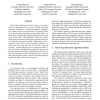Free Online Productivity Tools
i2Speak
i2Symbol
i2OCR
iTex2Img
iWeb2Print
iWeb2Shot
i2Type
iPdf2Split
iPdf2Merge
i2Bopomofo
i2Arabic
i2Style
i2Image
i2PDF
iLatex2Rtf
Sci2ools
ICDM
2003
IEEE
2003
IEEE
Tractable Group Detection on Large Link Data Sets
Discovering underlying structure from co-occurrence data is an important task in a variety of fields, including: insurance, intelligence, criminal investigation, epidemiology, human resources, and marketing. Previously Kubica et. al. presented the group detection algorithm (GDA) - an algorithm for finding underlying groupings of entities from co-occurrence data. This algorithm is based on a probabilistic generative model and produces coherent groups that are consistent with prior knowledge. Unfortunately, the optimization used in GDA is slow, potentially making it infeasible for many large data sets. To this end, we present k-groups - an algorithm that uses an approach similar to that of k-means to significantly accelerate the discovery of groups while retaining GDA’s probabilistic model. We compare the performance of GDA and k-groups on a variety of data, showing that k-groups’ sacrifice in solution quality is significantly offset by its increase in speed.
Related Content
| Added | 04 Jul 2010 |
| Updated | 04 Jul 2010 |
| Type | Conference |
| Year | 2003 |
| Where | ICDM |
| Authors | Jeremy Kubica, Andrew W. Moore, Jeff G. Schneider |
Comments (0)

